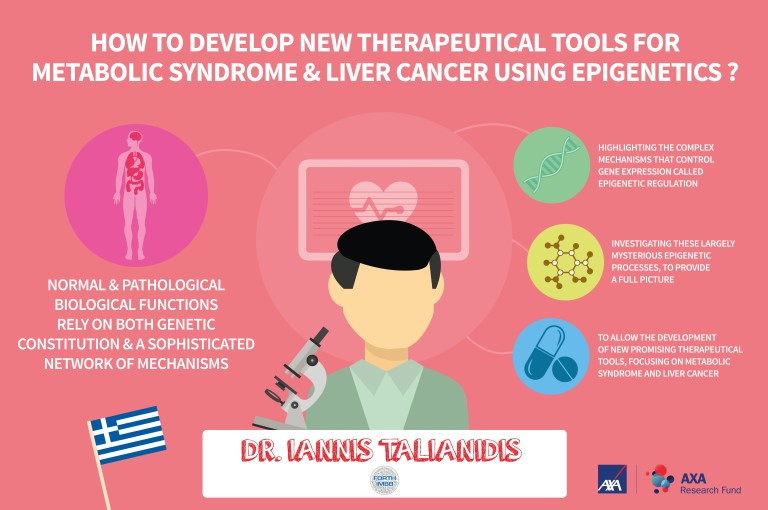This Chair is the first in Epigenetics in Greece.
In a high-profile event, held July 10 at the French embassy in Athens (Greece), AXA Greece along with AXA Research Fund announced the creation of an academic Chair in Epigenetics. The mission of the AXA Research Fund is to support academic research dedicated to societal progress through bettering our understanding of current global societal challenges, and ways to address them.
Following the AXA Research Fund’s 2016 selection, a twelve-year research in Epigenetics is supported for the first time in Greece, with an amount of €1.2 million in the Greek Institute of Molecular Biology and Biotechnology (IMBB), located in the city of Heraklion (Crete).
«The creation of this Chair in Epigenetics is a great honor for us. The Chair will provide important support for the lab and our future plans in the creation of a new division in the IMBB. This division will become a point of attraction for new researchers with benefits both for science and the society. Through this research, discoveries can arise that will support new ways to treat different types of diseases. Our target is to promote the scientific excellence of Epigenetics in Greece» said Dr. Ioannis Talianidis, Head of the Research program and Director of IMBB.
«In a world of constant challenges and new types of emerging risks, we have to offer protection to society, especially in health. Supporting academic researchers around the world represents one of the most important actions undertaken by AXA. I am proud for our colleagues in Greece and for the fact that our Group, through the AXA Research Fund, offers such an important support in a highly promising field of health research for improving our lives» stated Wilm Langenbach, CEO of AXA Emerging Markets (EMEA-LATAM – Europe, Middle East, Africa, Latin-America).
«For all of us working at AXA Greece, this day is a day of increased pride. On one side the work of a Greek researcher receives the highest possible support through the creation of an academic Chair, while on the other side the AXA Group, through its global activities, offers a support of important value to the Greek society. Health is an integral part of our daily work in Greece and the holistic protection we want to offer, starting today, receives a great boost» said Erikos Moatsos, CEO of AXA Greece.
Main scope of this research is to offer valuable knowledge on basic functions of life. This knowledge, in the long run, will help create targeted treatment solutions and pharmaceutical products that will contribute in the longevity and quality of life of people countering illnesses. The chairs’ main activities will focus to understand basic principles of epigenetics’ mechanisms that control the growth of liver, the metabolism and the creation of liver cancer.
The results of the research in the fight against the liver cancer and metabolism disorders will be crucial. The fundamental role of epigenetics’ routes in the illnesses’ pathogenesis as well as the reversible nature of epigenetics’ distortions that have to do with a disease (in contrast to genetics’ flaws), will provide new bases for focused treatments. Epigenetics therapies are expected to provide important discoveries in the fight against different types of cancer in the following decade. Rationally created epigenetics medicines will also become available to combine with conventional chemotherapies.
This “strategically combined treatment” will not only increase the therapeutic results of treatments but will also reduce the chances of cancer’s endurance against medicines. Such results are of special interest since they prepare new ways of research efforts to treat cancer with minimal negative effects.
The AXA Research Fund, the science philanthropy initiative of the AXA Group, is also supporting three other key research projects in Greece:
Nikolaos Bakas working on Abrupt jet stream reorganization and its climate impacts at the university of Athens, Georgios Michas working on understanding fluid-induced seismicity to mitigate the risks of man-made earthquakes at the Technological Educational Institute of Crete, and Konstantinos Palikaras working on keeping our brain safe from neurodegeneration through better understanding of brain ageing mechanism at the Institute of Molecular Biology and Biotechnology.

